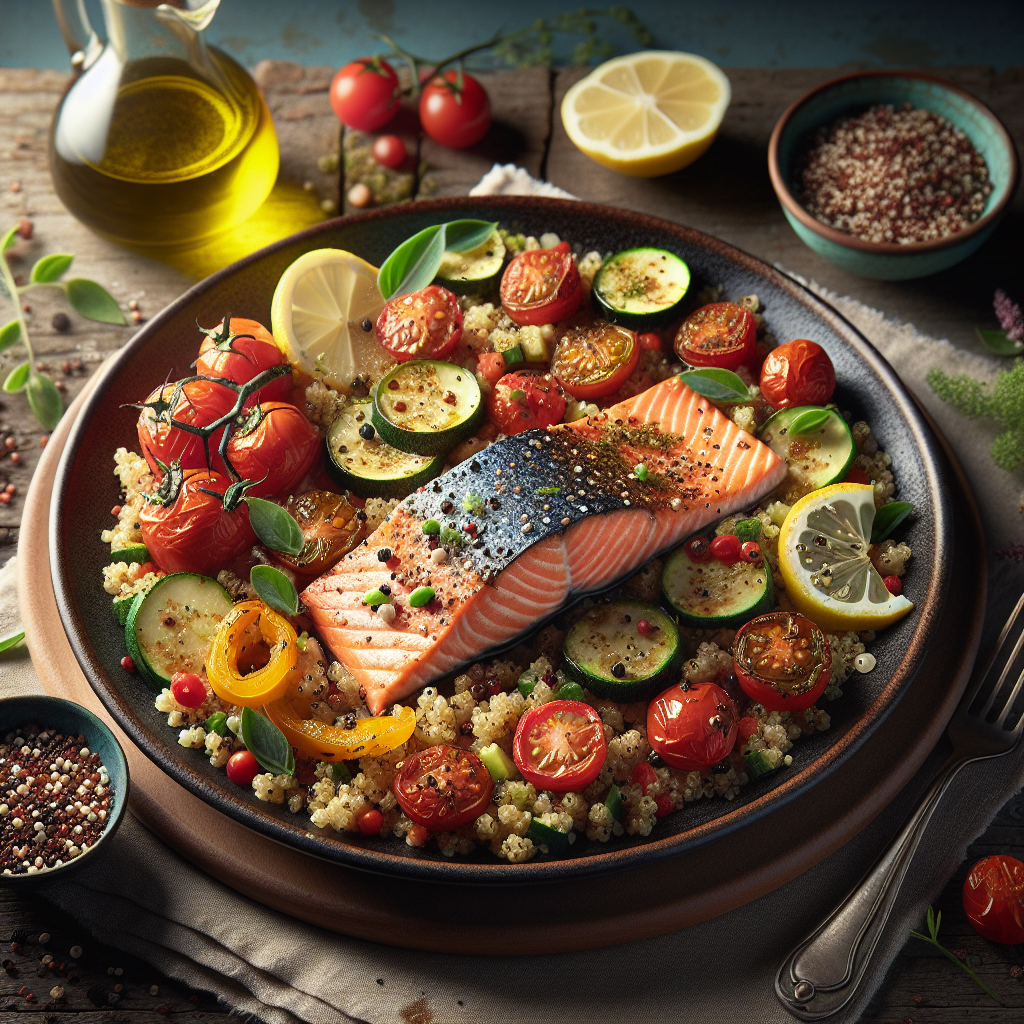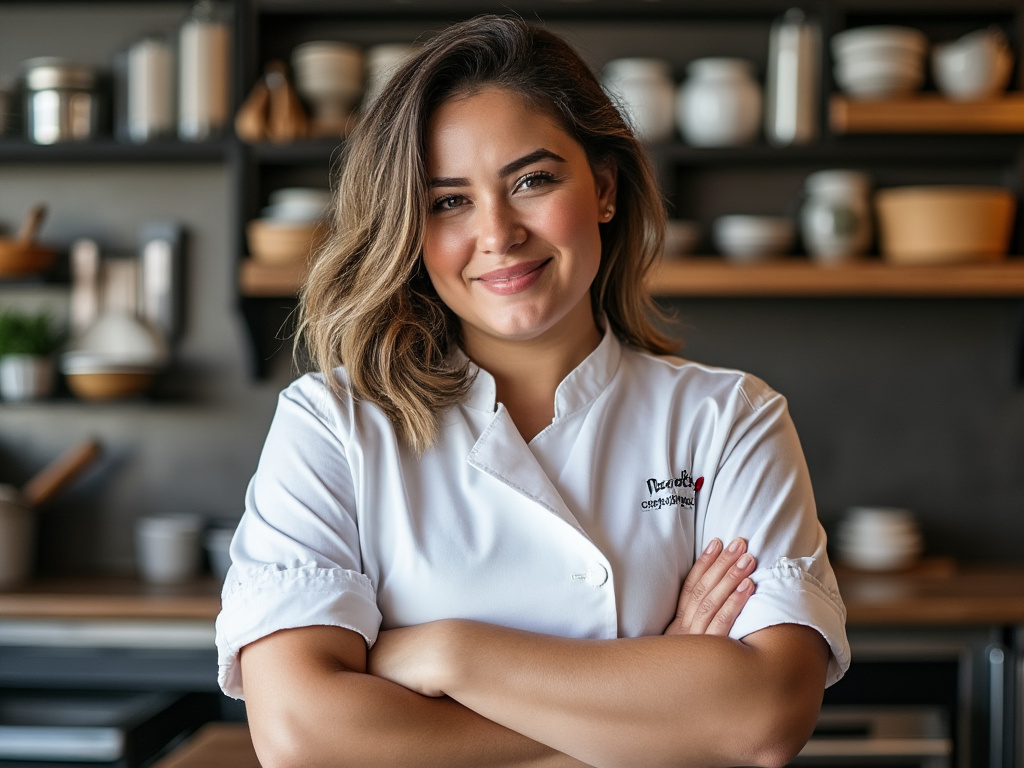
Transform your healthy eating journey with this nutrient-packed Mediterranean salmon dish. Perfect for PCOS management, this protein-rich meal combines omega-3 fatty acids from salmon with complex carbs from quinoa and colorful roasted vegetables for a balanced, delicious dinner that's ready in just 40 minutes.
Ingredients for Mediterranean PCOS-Friendly Baked Salmon with Quinoa (High-Protein Recipe)
- 21oz Salmon Fillets
- 7oz Quinoa
- 10.5oz Cherry Tomatoes
- 14oz Zucchini, chopped
- 7oz Red Bell Pepper, sliced
- 3 tbsp Olive Oil
- 1 whole Lemon
- 4 cloves Garlic Cloves, minced
- 2 tbsp Dried Oregano
- 1.5 tsp Salt
- 1 tsp Black Pepper
- 14oz Water
Instructions for Mediterranean PCOS-Friendly Baked Salmon with Quinoa (High-Protein Recipe)
- Preheat oven to 200°C/400°F. Line two baking sheets with parchment paper.
- Rinse 7oz quinoa thoroughly. In a pot, combine quinoa with 14oz water. Bring to boil, reduce heat, cover and simmer for 15-20 minutes until water is absorbed.
- In a large bowl, combine 10.5oz cherry tomatoes, 14oz zucchini, and 7oz red bell pepper. Toss with 2 tbsp olive oil, 2 cloves minced garlic, 1 tbsp oregano, 0.5 tsp salt, and 0.5 tsp black pepper.
- Spread vegetables on one baking sheet and roast for 20-25 minutes, stirring halfway through.
- Place 21oz salmon fillets on the second baking sheet. Drizzle with remaining 1 tbsp olive oil and season with remaining 2 cloves garlic, 1 tbsp oregano, 1 tsp salt, and 0.5 tsp black pepper. Squeeze juice of 1 whole lemon over salmon.
- Bake salmon for 12-15 minutes or until it flakes easily with a fork.
- Serve salmon over quinoa with roasted vegetables.
A Mediterranean Delight: PCOS-Friendly Baked Salmon with Quinoa
As someone who's passionate about creating healthy, flavorful meals that support hormonal health, I'm thrilled to share this Mediterranean-inspired baked salmon recipe. This dish combines the rich omega-3 fatty acids from perfectly baked salmon with protein-packed quinoa and colorful roasted vegetables, creating a balanced meal that's not only delicious but also specifically designed for those managing PCOS. With just 40 minutes from start to finish, this recipe delivers an impressive 38g of protein per serving while keeping the carbs moderate at 35g - perfect for maintaining stable blood sugar levels. The Mediterranean flavors, brought to life with fresh garlic, oregano, and a bright squeeze of lemon, transform simple ingredients into a restaurant-worthy dish that you'll want to make again and again.
A Personal Journey with this Mediterranean Salmon Recipe
I discovered this recipe during my own journey of exploring hormone-friendly cooking. Growing up in South America, I was always fascinated by how different cultures use food as medicine. When a close friend was diagnosed with PCOS, we spent countless evenings in my kitchen, experimenting with ingredients that could support her health journey. This Mediterranean salmon dish became our go-to recipe. I remember the first time we made it - the kitchen filled with the aromatic blend of garlic and oregano, and the way her eyes lit up when she realized healthy eating didn't mean bland food. Now, whenever I prepare this dish, it reminds me of those meaningful kitchen experiments and the power of food to heal and bring people together.
Pro Tips for Perfect PCOS-Friendly Baked Salmon
To make this Mediterranean salmon truly exceptional, here are my tried-and-true tips:
- Pat your salmon fillets dry before seasoning to ensure a perfect golden crust
- Don't skip rinsing the quinoa - this removes the natural bitter coating and results in fluffier grains
- Cut your vegetables in similar sizes (about 1-inch/2.5cm pieces) for even roasting
- For the most flavorful zucchini, let it get slightly golden brown in the oven - those caramelized edges are delicious
- Check your salmon at the 12-minute mark - overcooked salmon can become dry
- Let the salmon rest for 3-5 minutes after baking for the juices to redistribute
- For meal prep, you can roast the vegetables and cook the quinoa up to 2 days ahead
- Choose wild-caught salmon when possible for higher omega-3 content Remember, the key to perfect salmon is watching it closely - it should flake easily but still be slightly translucent in the center.
Serving and Storage Suggestions
This Mediterranean baked salmon with quinoa makes 4 generous servings, each providing a complete, nutrient-rich meal. For the perfect presentation, start with a bed of fluffy quinoa, arrange the colorful roasted vegetables alongside, and crown it with the perfectly baked salmon fillet. A few serving suggestions to elevate your meal:
- Garnish with fresh herbs like basil or parsley for an extra Mediterranean touch
- Add a wedge of lemon for squeezing at the table
- Consider serving with a small side salad dressed with olive oil and lemon juice
- For extra healthy fats, sprinkle with a few chopped olives or pine nuts
Leftovers can be stored in an airtight container in the refrigerator for up to 2 days. While reheating, cover the salmon with foil and warm gently in a 300°F/150°C oven to prevent drying. The quinoa and vegetables can be reheated in the microwave with a splash of water to restore moisture. This dish also works well for meal prep - just store the components separately and assemble when ready to eat.
Creative Substitutions for Your Mediterranean Salmon Bowl
Let me share some tried and tested substitutions for this Mediterranean PCOS-Friendly Salmon dish that won't compromise its nutritional benefits. For the star of the show, if salmon isn't your thing or you're looking to switch it up, you can use other fatty fish like trout (same cooking time) or cod (might need an extra 2-3 minutes). If you're going plant-based, thick-cut portobello mushrooms make a surprisingly satisfying alternative – just brush them generously with olive oil and reduce cooking time to 10 minutes.
Quinoa can be swapped with other nutrient-rich grains like brown rice or farro, though you'll need to adjust cooking times accordingly (brown rice needs about 40 minutes, farro about 30 minutes). For a lower-carb version, cauliflower rice works beautifully – it only needs 5-7 minutes to cook and adds extra vegetables to your meal.
When it comes to the vegetables, feel free to get creative! Bell peppers of any color work great, and you can substitute zucchini with summer squash or eggplant. Cherry tomatoes can be replaced with regular tomatoes cut into chunks, or for a different flavor profile, try roasted carrots or butternut squash – just cut them slightly smaller to maintain the cooking time.
For the aromatics and seasonings, fresh basil or thyme can stand in for oregano, and if you're out of fresh garlic, use 1/2 teaspoon of garlic powder per clove. Lime can replace lemon in a pinch, and for the olive oil, avocado oil makes an excellent alternative with a similar healthy fat profile.
Nutrition Facts: Why This Salmon Bowl is a Powerhouse Meal
This Mediterranean salmon bowl isn't just delicious – it's a nutritional superstar, especially for those managing PCOS. Let's break down what each serving provides: 485 calories, 38g of protein, 35g of carbohydrates, 24g of healthy fats, and 6g of sugar. But these numbers only tell part of the story!
The salmon provides high-quality protein and essential omega-3 fatty acids, particularly EPA and DHA, which are crucial for reducing inflammation and supporting hormone balance. One serving delivers about 75% of your daily protein needs, making it perfect for maintaining stable blood sugar levels – a key factor in PCOS management.
Quinoa contributes complete protein (rare for a grain!) and complex carbohydrates, helping to keep you satisfied longer. It's also rich in magnesium and zinc, minerals that play important roles in insulin sensitivity and hormone regulation.
The colorful vegetable medley isn't just for show – these Mediterranean-inspired veggies pack a serious nutritional punch. The bell peppers provide more vitamin C than an orange, while tomatoes offer lycopene, a powerful antioxidant. Zucchini adds fiber and potassium while keeping the calorie count reasonable.
The olive oil isn't just for cooking – it provides heart-healthy monounsaturated fats and antioxidants that support overall health. Combined with garlic and oregano, you're also getting a dose of anti-inflammatory compounds that can help manage PCOS symptoms.
Allergen Information and Dietary Considerations
Good news for those with dietary restrictions – this Mediterranean salmon dish is naturally free from many common allergens! It's gluten-free, dairy-free, and contains no tree nuts or peanuts. However, if you have a fish allergy, please see the substitution section for alternatives.
The recipe fits into several dietary patterns:
- Gluten-free
- Dairy-free
- Mediterranean diet
- Whole30 (when served without quinoa)
- Paleo (when served without quinoa)
- Low FODMAP (in moderate portions)
While this recipe is designed to be PCOS-friendly, it's equally suitable for anyone following a clean eating or anti-inflammatory diet. The ingredients are minimally processed and focus on whole foods.
Smart Storage Solutions for Your Salmon Bowl
To make the most of your Mediterranean salmon dish, proper storage is key. The cooked meal will keep well in an airtight container in the refrigerator for up to 3 days. I recommend storing the components separately if possible – this keeps the quinoa from absorbing too much moisture from the vegetables and helps maintain the salmon's texture.
For meal prep purposes, you can cook the quinoa and roast the vegetables up to 3 days in advance. The salmon is best prepared fresh, but if needed, it can be cooked a day ahead and gently reheated.
Freezing is possible, though the texture of the vegetables may change slightly. If freezing, store in airtight containers for up to 2 months. Thaw overnight in the refrigerator and reheat gently to maintain the salmon's moisture.
Frequently Asked Questions About This Mediterranean Salmon Recipe
Can I make this recipe ahead of time? Yes! Cook the quinoa and vegetables up to 3 days ahead. The salmon is best prepared fresh but can be made a day in advance if necessary.
How do I know when the salmon is done? The salmon should flake easily with a fork and be slightly pink in the center. For food safety, the internal temperature should reach 145°F (63°C).
Can I use frozen salmon? Absolutely! Thaw completely in the refrigerator overnight and pat dry before cooking. You may need to add 2-3 minutes to the cooking time.
Is this recipe really PCOS-friendly? Yes! The combination of lean protein, healthy fats, and complex carbohydrates helps maintain stable blood sugar levels. The anti-inflammatory ingredients support hormone balance.
Can I use different vegetables? Definitely! Any Mediterranean-style vegetables will work well. Just keep the pieces similarly sized for even cooking.
Final Thoughts on This PCOS-Friendly Mediterranean Salmon Bowl
This Mediterranean Baked Salmon with Quinoa isn't just another healthy recipe – it's a thoughtfully crafted meal that brings together the best of Mediterranean cuisine while supporting hormonal health. What I love most about this dish is how it transforms simple, wholesome ingredients into a restaurant-worthy meal that's actually good for you.
The combination of protein-rich salmon, nutrient-dense quinoa, and colorful roasted vegetables creates a perfect balance of flavors and textures while providing the essential nutrients needed for PCOS management. It's a testament to how healthy eating doesn't have to be bland or boring.
Whether you're managing PCOS, following a Mediterranean diet, or simply looking for a nutritious and delicious meal, this recipe delivers on all fronts. It's become a staple in my kitchen, and I hope it becomes one in yours too. Remember, healthy eating is a journey, and recipes like this make that journey both enjoyable and sustainable.
